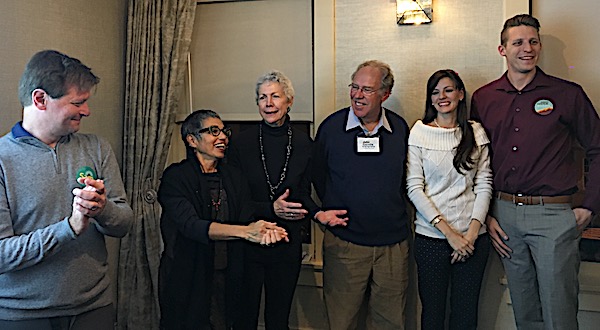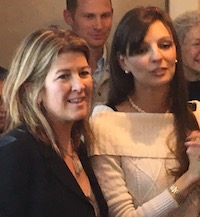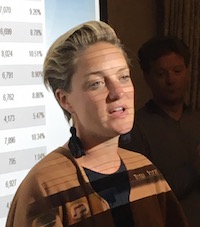Slow-growthers prevail in City Council election
Bob Wells | Nov 8, 2017

Boulder voters had their say Tuesday, Nov. 7, and elected a slate of City Council candidates expressing varying degrees of repudiation of relatively pro-development competitors for the five open seats. The mood was celebratory on the Boulderado Hotel mezzanine as several of the night’s winners and their supporters watched the returns come in on election night.

For the record
The two top vote-getters, re-elected for four-year terms, were Mary Young and Sam Weaver, followed by newcomers Jill Grano and Mirabai Nagle, also for four-year stints, with Council returnee and ex-CU Regent Cindy Carlisle finishing fifth, gaining (under Boulder’s slightly bizarre election rules) a two-year term on Council. All except Grano had been endorsed by PLAN-Boulder County, a long-time foe of Boulder’s more gung-ho developers; Grano, a Realtor, had gained a Sierra Club endorsement. Former Planning Board member John Gerstle ran strong in early-evening returns but ended just out of the running in sixth place.

That faction, some of whom have openly rallied under the slogan of YIMBY (Yes in My Backyard), has advocated such strategies as inserting extra housing units into low-density neighborhoods (dubbing them “accessory dwelling units” or “granny flats”), and combatting urban sprawl by packing new, high-density housing along major Boulder thoroughfares.
Based on this election, the YIMBY faction’s analysis and plan of action seem to have been repudiated by a majority of Boulder voters.
UPDATE: In a drip-drip reversal of the Tuesday-night numbers as vote-counting proceeded into Wednesday, voters finally appeared to have passed (by a 52-to-48 percent margin) Ballot Issue 2L, a measure that will raise more tax money to continue funding Boulder’s attempt to municipalize its electrical system. Somehow having gained along the way the branding-nightmare nickname of “the muni,” that effort will roll on, championed by environmentalists but lambasted by much of the business community. (Official vote tallies were still unavailable as of Wednesday night.)


Best news analysis of what happened Tuesday night.
Beside this informative cliff note of the Boulder Tuesday night election results, I am delighted that you updated the report on ‘The Muni’. I feel certain that this victory in history to come will be embraced & cheered by All. Just as in tales I’ve heard about what it was like when the Open Space legislation was being born – 50+ years ago – & some people bitterly opposed it, in the end the Open Space legacy was built which blesses all eyes that gaze upon her!
I’m glad to hear that some sanity has returned to the city council. Thanks for the analysis.
Good analysis, Mr. Wells. I appreciate your explaining the meaning of Tuesday’s vote — the city would do well to slow down a bit and take a look around. Of course we can’t block all development — nor should we — but let’s give a little more consideration to the city’s character and what makes it a wonderful place to live. I heard of a recent study that Colorado Springs may be the largest city in the state in 2050. They can have it.
Good overview with thoughtful insights. Thanks for this update.